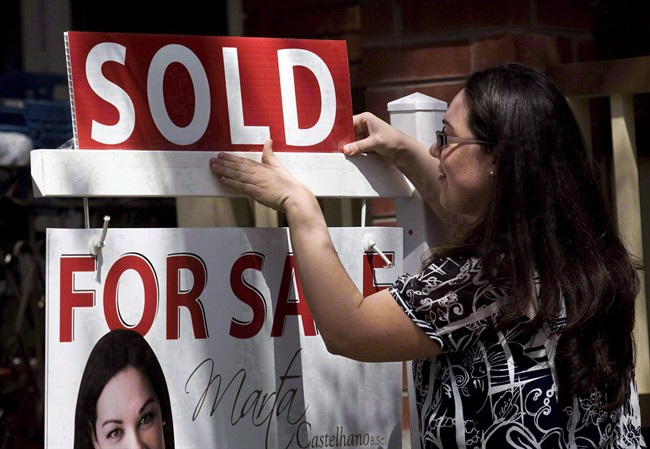The skyrocketing cost of houses in the burning-hot markets of Vancouver and Toronto is ratcheting up the odds of a steep correction and could lead to “payback” in the months ahead, TD Economics warns.

Figures released Tuesday by the Canadian Real Estate Association show the price of the average single-family home in Greater Vancouver jumped 25 per cent to $1.2 million this January compared to the same time last year, while the Toronto area saw a spike of 12 per cent to $683,000.
Yet as prices in those two areas continue to soar, the economics arm of TD Bank is warning that such huge year-over-year gains increase the odds of a price collapse.
READ MORE: Vancouver housing prices jump over 30%; Toronto also sees spike
“Every month of double-digit home price growth raises the risk of a deeper home price correction down the road,” economist Diana Petramala warns in a research note.
The bank notes the January surge may be partly due to a last-minute rush by buyers to buy before tougher down-payment rules took effect Monday on mortgages for homes over $500,000 — a move that will add tens of thousands of dollars to the up-front cash required for an insured mortgage.

Get breaking National news
Areas that saw the biggest jump in prices are those with average sales prices in the affected $500,000 to $1-million range, Petramala says, and Toronto and Vancouver could ease off in the short term.
READ MORE: New mortgage rules are about to hit first-time buyers in hot housing markets
- Drought damage raises risk of power outages as B.C. faces 1st big storm of the fall
- BC NDP’s housing promise would finance 40% of home for first-time buyers
- Vancouver short-term rentals to soon include properties rented less than 90 days
- ‘Change can happen’: Residential school march victim finds justice in dangerous driving verdict
“While from a medium-term perspective we do believe the new rules will have a marginal impact on the market, there still may be some payback in the coming months following the sharp gains experienced in January.”
TD issue a report last week describing the Canadian housing market as a “three speed” affair, with Toronto and Vancouver outliers compared to the declining Prairies and stable prices in the rest of Canada.
Though it cautioned the volatile real estate markets of Toronto and Vancouver will continue to get a boost from foreign investment and worker migration, they should cool down this year and next due to the tighter down-payment rules and the slow upward creep in interest rates.
But a correction in Vancouver and Toronto may still be some ways off, said RBC Senior Economist Robert Hogue.
“Unless you have something that will shock the market (then) you’ll trigger a significant downturn, but at this stage we’re hard pressed to see what would be that trigger,” he said in an interview.
“Three or four months from now we’ll still be concerned about overheating in Vancouver and some segments of the Toronto market,” Hogue said.
“We’re expecting some slowing in activity but probably not in the near term — probably later this year,” he added.
READ MORE: The least affordable places to live in Canada are…
Using one common rule of thumb for housing affordability — the price to income ratio — the latest Vancouver and Toronto prices could potentially add fuel to the fire of those worried about real estate becoming unattainable.
Greater Vancouver residents would have to dedicate 17 years’ worth of median pre-tax income to buy outright the average single-family home. Toronto homebuyers, meanwhile, would have to set aside nine years’ pay.








Comments